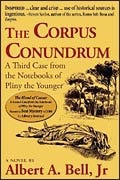Third in a mystery series, The Corpus Conundrum features as sleuth the first-century Roman author and magistrate Pliny the Younger. He was the nephew and adopted son of Pliny the Elder, who authored and published the encyclopedic Natural History and died in the Vesuvius eruption of 79 A.D. It's a clever basis for a mystery series, allowing the younger Pliny to plausibly recall details from his uncle's "unpublished observations on many scientific topics, including causes of death."
In The Corpus Conundrum, Pliny encounters the puzzling body of a man in the woods behind his seaside villa at Laurentum. His dogs whine and circle the body, refusing to go near it. Sharing his uncle's fascination with the processes of nature, Pliny examines the corpus and resolves to find out how the man died. "What puzzled me the most at the moment was the lack of dark splotches on any part of the body. During his extensive military service, my uncle had observed that, when a person dies, discolorations, almost like bruises, develop after a short time on whatever side of the body is lowest." He has his slaves move it into an empty stall in his stable and seals the door to prevent tampering. The next morning, to his consternation, the body has disappeared.
Also playing roles are Pliny's mother; his irritating friend Tacitus; a pair of officious duovirs responsible for law and order in Laurentum; a beautiful whore; an ingratiating young man claiming to be the missing corpse's son; and a woman accused of being an empusa, a blood-sucking, night-wandering ghoul. Pliny is a rationalist disinclined to accept supernatural explanations, but as events grow stranger his rationalism is tested, something that would feel more credible if the novel's rather flat prose style evoked a spookier atmosphere. Regardless, something is always happening to keep the pacing brisk, and the story offers an engaging introduction to the Plinys elder and younger, both significant figures in Roman literature. (2011; 279 pages, including a Glossary and an English translation of a letter by Pliny describing his villa at Laurentum)




